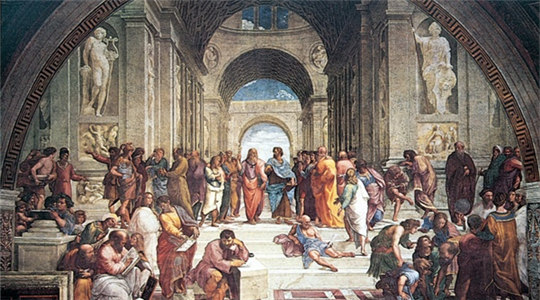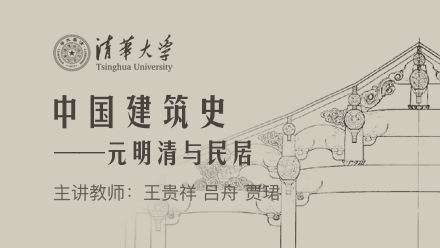
当前课程知识点:Plato, Socrates, and the Birth of Western Philosophy > Seeking “shi”(是)—— the Sprout of Rationality > 7.Parmenides’ thinking(2) > Parmenides’ thinking(2)
返回《Plato, Socrates, and the Birth of Western Philosophy》慕课在线视频课程列表
返回《Plato, Socrates, and the Birth of Western Philosophy》慕课在线视频列表
我们在上面反反复复地强调
希腊哲学 不是在某一个时刻
突然就迸发出来了
也就是说
好比说在某个特定的时间
在那时间之前就有了
在那时间之前没有希腊哲学
在某个时间之后就有了希腊哲学
希腊哲学的发展
不是那么一个简单地
时间点的确认的问题
我们判断希腊民族
什么时候有了自己的哲学
有了自己的哲学家
我们需要一个标准
我在这里尝试性地提出判断哲学
可以有这么四条标准
按照这四条标准去判断
我们实际上可以鉴别出
现在被我们称作哲学家的
这些希腊早期哲人
他的思维方式达到了哪一步
这四个标准
第一我认为哲学家的思维
他的应当是以抽象思维为主
而以形象思维为辅
也就是说
这个哲学家的思维方式
他已经从形象思维为主
发展到抽象到抽象思维为主
这是一个标准
第二个标准呢
是这位哲学家 他的思想
应当是他逻辑思维的结果
而不是非逻辑思维的结果
第三条标准是
这位哲学家他的思想
应当是理性思维的产物
而不是非理性思维的产物
第四条标准
这条标准有点特别地针对巴门尼德
这条标准是这位哲学家的思想
他应当是理性论证的结果
而不能是像以往传统思维
那些祭司们所做出的独断
巴门尼德那个时代在希腊社会上
我们以后会提到
它是一个宗教的社会
宗教的代表人物
那些宗教祭司们
他们也说话
他们也把自己的想法告诉民众
但是他们在讲话的时候
是以神的代言人自居的
他们说的话就是神的话
神要把他的意思告诉民众
他不需要做什么理性的论证
而哲学家要表达自己的观点
他就要用理性的证明
所以掌握了判断希腊哲学家
所达到的思维水平
我们可以按照我刚才说的
这四条标准 去逐一鉴别
我们今天分析了
赫拉克利特和巴门尼德
我们分析了他们的思维
他们的思维具有的一些特点
所以我下面结合这么一个问题
来请同学们做进一步的理性思考
哲学史研究中间
历来认为 泰勒斯
那位米利都哲学家
是西方哲学的起点
是第一位希腊哲学家
我通过对希腊哲学家的思维方式的分析
我感到把泰勒斯
称为第一位哲学家
其实有点勉强
那么如果我们要以一位哲学家
为希腊哲学的起点
也就是说谁是第一位希腊哲学家
同学们可以结合这么两个问题
去寻找你自己的结论
第一个问题是
希腊哲学的起点在哪里
这个问题的另外一层意思
就是谁是第一位希腊哲学家
第二个问题是
理性思维 逻辑思维
它的重要性何在
这一讲我就讲到这
-1.Etymology
-2.Definition and the History of Philosophy
--Definition and the History of Philosophy
-3.Religion
--Religion
-4.Culture
--Culture
-5.Theory of Cultural Transformation and Interaction: Five theoretical premise
--Theory of Cultural Transformation and Interaction: Five theoretical premise
-6.Theory of Cultural Transformation and Interaction:Five Basic Position
--Theory of Cultural Transformation and Interaction:Five Basic Position
-7.The Significance of Theory of Cultural Transformation and Interaction
--The Significance of Theory of Cultural Transformation and Interaction
-Self-test Exercises
-Thinking Questions
-1.The Birth Environment of the Greek Philosophy(1)
--The Birth Environment of the Greek Philosophy(1)
-2.The Birth Environment of Greek Philosophy(2)
--The Birth Environment of Greek Philosophy(2)
-3.The Stages and Schools of Greek Philosophy(1)
--The Stages and Schools of Greek Philosophy(1)
-4.The Stages and Schools of Greek Philosophy(2)
--The Stages and Schools of Greek Philosophy(2)
-5.The Local Characteristics of Ancient Greek Philosophy and the progress of internationalization(1)
--The Local Characteristics of Ancient Greek Philosophy and the progress of internationalization(1)
-6.The Local Characteristics of Ancient Greek Philosophy and the progress of internationalization(1)
--The Local Characteristics of Ancient Greek Philosophy and the progress of internationalization(1)
-7.The termination of Ancient Greek Philosophy
--The termination of Ancient Greek Philosophy
-Self-test Excercises
-Thinking Questions
-1.A transition to rational thinking(1)
--A transition to rational thinking(1)
-2.A transition to rational thinking(2)
--A transition to rational thinking(2)
-3.A transition to rational thinking(3)
--A transition to rational thinking(3)
-4.A transition to rational thinking(4)
--A transition to rational thinking(4)
-5.Heraclitus’ thinking
-6.Parmenides’ thinking(1)
-7.Parmenides’ thinking(2)
-Self-test Excercises
-Thinking Questions
-1.Seeking the origin:the early philosophers(1)
--Seeking the origin:the early philosophers(1)
-2.Seeking the origin:the early philosophers(2)
--Seeking the origin:the early philosophers(2)
-3.Seeking the essence: Plato’s theory of Form (1)
--Seeking the essence: Plato’s theory of Form (1)
-4.Seeking the essence: Plato’s theory of Form (2)
--Seeking the essence: Plato’s theory of Form (2)
-5.Seeking to on: Aristotle’s ontology and metaphysics (1)
--Seeking to on: Aristotle’s ontology and metaphysics (1)
-6.Seeking to on: Aristotle’s ontology and metaphysics (2)
--Seeking to on: Aristotle’s ontology and metaphysics (2)
-Self-test Excercises
-Thinking Questions
-1.The lexical meaning
-2.Epistemology(1)
-3.Epistemology(2)
-4.Epistemology(3)
-5.Epistemology(4)
-6.The features
-Self-test Excercises
-Thinking Questions
-1.A lexical meaning(1)
-2.A lexical meaning(2)
-3.A lexical meaning(3)
-4.Plato’s Dialectics(authentic true)
--Plato’s Dialectics(authentic true)
-5.Aristotle’s Logics(judging true)(1)
--Aristotle’s Logics(judging true)(1)
-6.Aristotle’s Logics(judging true)(2)
--Aristotle’s Logics(judging true)(2)
-Self-test Excercises
-Thinking Questions
-1.A lexical meaning
-2.The occurrence and development of the ancient Greek Science(1)
--The occurrence and development of the ancient Greek Science(1)
-3.The occurrence and development of the ancient Greek Science(2)
--The occurrence and development of the ancient Greek Science(2)
-4.The occurrence and development of the ancient Greek Science(3)
--The occurrence and development of the ancient Greek Science(3)
-5.The occurrence and development of the ancient Greek Science(4)
--The occurrence and development of the ancient Greek Science(4)
-6.The occurrence and development of the ancient Greek Science(5)
--The occurrence and development of the ancient Greek Science(5)
-7.the technicalization and application of ancient Greek Science(1)
--the technicalization and application of ancient Greek Science(1)
-8.the technicalization and application of ancient Greek Science(2)
--the technicalization and application of ancient Greek Science(2)
-Self-test Excercises
-Thinking Questions
-1.A Lexical meaning
-2.Plato’s theory of Love
-3.The high praise to the love god: a reading on Symposium (1)
--The high praise to the love god: a reading on Symposium (1)
-4.The high praise to the love god: a reading on Symposium (2)
--The high praise to the love god: a reading on Symposium (2)
-5.The high praise to the love god: a reading on Symposium (3)
--The high praise to the love god: a reading on Symposium (3)
-6.The high praise to the love god: a reading on Symposium (4)
--The high praise to the love god: a reading on Symposium (4)
-Self-test Excercises
-Thinking Questions
-1.A lexical analysis
-2.The development of the Classic Greek Ethics(1)
--The development of the Classic Greek Ethics(1)
-3.The development of the Classic Greek Ethics(2)
--The development of the Classic Greek Ethics(2)
-4.The development of the Classic Greek Ethics(3)
--The development of the Classic Greek Ethics(3)
-5.The development of the Classic Greek Ethics(4)
--The development of the Classic Greek Ethics(4)
-6.From the ultimate goodness to the common goodness(1)
--VideoFrom the ultimate goodness to the common goodness(1)
-7.From the ultimate goodness to the common goodness(2)
--From the ultimate goodness to the common goodness(2)
-Self-test Excercises
-Thinking Questions
-1.A lexical meaning
-2.Ancient humanistic trend of thoughts(1)
--Ancient humanistic trend of thoughts(1)
-3.Ancient humanistic trend of thoughts(2)
--Ancient humanistic trend of thoughts(2)
-4.Ancient humanistic trend of thoughts(3)
--Ancient humanistic trend of thoughts(3)
-5.A theoretical summary
-Self-test Excercises
-Thinking Questions
-1.A lexical analysis
-2.The story of Gyges
-3.The Ancient theory of justice(1)
--The Ancient theory of justice(1)
-4.The Ancient theory of justice(2)
--The Ancient theory of justice(2)
-4.The Ancient theory of justice(3)
--The Ancient theory of justice(3)
-Self-test Excercises
-Thinking Questions
-1.An explanation to the related words
--An explanation to the related words
-2.A Platonic Republic
-3.Cicero’s people’s Republic(1)
--Cicero’s people’s Republic(1)
-4.Cicero’s people’s Republic(2)
--Cicero’s people’s Republic(2)
-Self-test Excercises
-Thinking Questions
-1.A lexical analysis
-2.The religious trends in the late period of ancient Greek philosophy(1)
--The religious trends in the late period of ancient Greek philosophy(1)
-3.The religious trends in the late period of ancient Greek philosophy(2)
--The religious trends in the late period of ancient Greek philosophy(2)
-4.The religious trends in the late period of ancient Greek philosophy(3)
--The religious trends in the late period of ancient Greek philosophy(3)
-5.The religious trends in the late period of ancient Greek philosophy(4)
--The religious trends in the late period of ancient Greek philosophy(4)
-6.The collision between faith and reason(1)
--The collision between faith and reason(1)
-7.The collision between faith and reason(2)
--The collision between faith and reason(2)
-Self-test Excercises
-Thinking Questions
-1.An explanation to the related words
--An explanation to the related words
-2.Communion with gods(1)
-3.Communion with gods(2)
-4.Communion with gods(3)
-5.Communion with gods(4)
-6.Plotinus’ mystical system of thoughts
--Plotinus’ mystical system of thoughts
-Self-test Excercises
-Thinking Questions
-1.The local characteristics of the ancient Greek Philosophy
--The local characteristics of the ancient Greek Philosophy
-2.The progressive universalization of the ancient Greek Philosophy
--The progressive universalization of the ancient Greek Philosophy
-3.The basic spirits of the ancient Greek Philosophy(1)
--The basic spirits of the ancient Greek Philosophy(1)
-4.The basic spirits of the ancient Greek Philosophy(2)
--The basic spirits of the ancient Greek Philosophy(2)
-Self-test Excercises
-Thinking Questions


